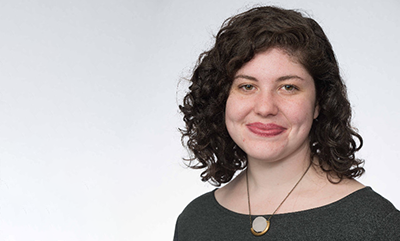Leveraging Public Health to Promote Meaningful Gun Reform.

Emily Popky Activist Fellow
Breakfast: Coffee, oatmeal
Hometown: Huntington, NY
Extracurriculars: I love cooking and baking (I work in a cafe a few days a week), knitting, and making things of all kinds.
Emily Popky is an MPH candidate working towards a health policy and law certificate at SPH and serves as the activist fellow on ERPO implementation with the Massachusetts Coalition to End Gun Violence. We sat down with Emily to learn about her experience.
Why did you apply to be the Activist Fellow on gun violence prevention?
I’ve been passionate about gun control for a long time, and the shooting in Parkland really made me want to work on this issue from a public health standpoint. In the spring I took Mike Siegel’s Public Health Advocacy course, which was an amazing opportunity to develop my advocacy skills around an issue that I care about, which is gun violence prevention. That class really inspired me to make this issue my focus and taught me how to use public health to promote meaningful gun reform. When I saw the Activist Lab fellowship would be on gun control legislation in Massachusetts, I thought this would be the perfect opportunity to combine my health policy background, the advocacy skills I gained in Mike’s class, and my passion for reducing gun violence.
What is ERPO, and why is it important?
ERPO stands for Extreme Risk Protection Order, which is an order for a judge for an individual to temporarily surrender any of their firearms. Family or household members, along with dating partners, can file an ERPO if they believe the individual is at risk of hurting themselves or others. ERPO is a really powerful tool for a lot of reasons: It can be used for individuals in domestic violence situations, or when an individual is exhibiting warning signs of violence towards themselves or others. ERPO laws have been found to significantly reduce firearm suicides in states where they have been enacted.
What work have you been doing over the last semester?
I’ve been working with the coalition to put together a comprehensive public awareness campaign for ERPO. It’s a pretty new law, created over the summer, and a lot of people don’t know that it exists. We’re working on a plan to make sure that both professional groups like mental health and social service providers know about this law and can inform their clients, and that the general public is aware of ERPO and understands how to use it.
What advice would you give the next Activist Fellow?
Try to be involved with as many aspects of the organization’s work as possible. Getting to learn about the coalition’s work outside of the policy area has been one of the best parts of the fellowship, so I’m getting a really well-rounded experience with an advocacy organization.
Comments & Discussion
Boston University moderates comments to facilitate an informed, substantive, civil conversation. Abusive, profane, self-promotional, misleading, incoherent or off-topic comments will be rejected. Moderators are staffed during regular business hours (EST) and can only accept comments written in English. Statistics or facts must include a citation or a link to the citation.